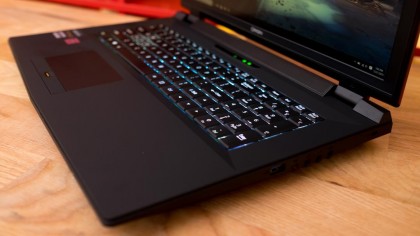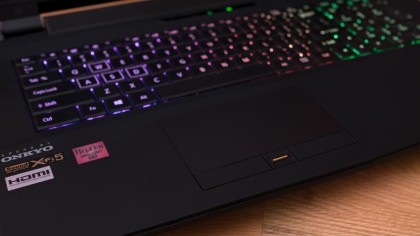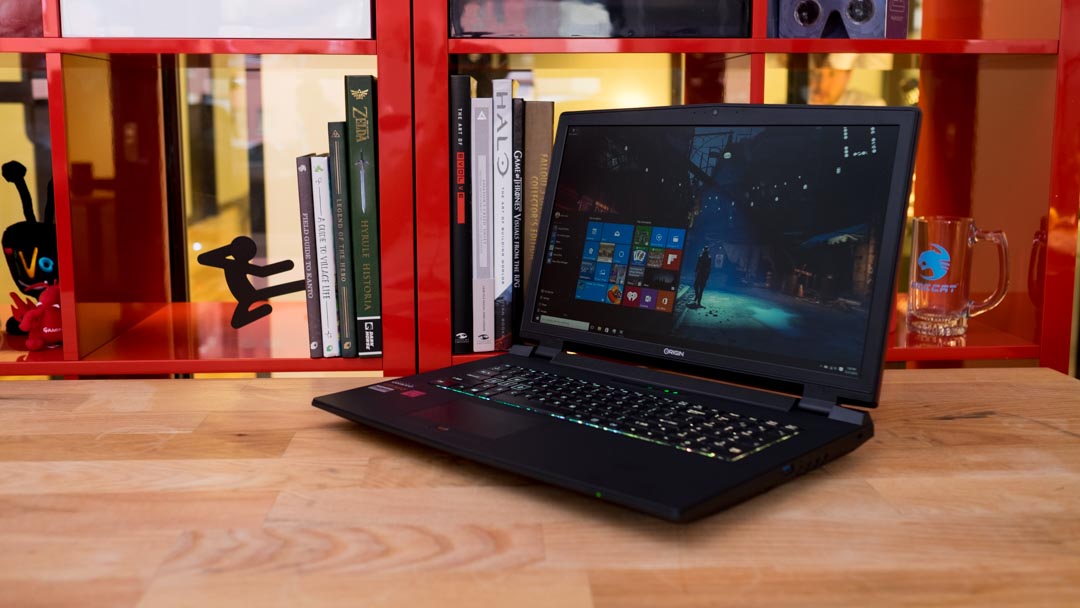Why you can trust TechRadar
Origin may have opted to dump the optical drive on the EON17-X, but it still weighs a substantial 8.6 pounds (3.9kg) and measures 1.52 inches (39mm) thick. Because of its large 17-inch screen, it will also take up a considerable amount of desk space with its other 16.46 x 11.1 inch (418 x 282mm; W x D) dimensions.
Comparatively, the Alienware 17 only weighs in at 8.33 pounds (3.78kg) and is thinner, but its bulky body ends up bumping its footprint up to 16.93 x 11.49 x 1.35 inches or 430 x 291 x 34mm (W x D x H). The Aorus X7 Pro is an even lighter, 6.6 pound (2.99kg) machine despite being the only SLI-equipped unit in this roundup. The X7 is also the thinnest device, with 16.85 x 12.01 x 0.9-inch (428 x 305 x 23mm) dimensions.

Here is the Origin EON17-X configuration sent to TechRadar for review:
Spec Sheet
- CPU: 4.0GHz Intel Core i7-6700K (quad-core, 8MB cache, up to 4.2GHz with Turbo Boost)
- Graphics: Single 8GB Nvidia GTX 980M (G-SYNC support), Intel HD Graphics 530
- RAM: 16GB Kingston HyperX Impact DDR4 (2133MHz; 2 x 8GB)
- Screen: 17-inch, 1,920 x 1,080 IPS matte display with G-SYNC
- Storage: 250GB Samsung 850 EVO m.2 SATA, 1TB Seagate solid-state hybrid drive
- Ports: 3 x USB 3.0, 1 x USB 3.1 Type-C, HDMI, 2 x DisplayPort, eSATA, SD card reader, headphone jack, microphone jack, S/PDIF output jack, line-in jack
- Connectivity: Killer Wireless AC 1535 dual band + Bluetooth
- Camera: Built-in 2.0MP video camera
- Weight: 8.6 pounds
- Size: 16.46 x 11.1 x 1.52 inches (W x D x H)
Fully configured as above (plus the banana crate it ships in, the Origin EON17-X rings up for $2,733 (about £1,834, AU$3,807). That might sound like a lot of simoleons to spring on a gaming laptop. Just keep in mind you're getting the most powerful desktop Skylake processor available and the highest-end mobile graphics chip. With a few smart downgrades, you could get this same machine for $2,099 (about £1,408, AU$2,927) with the best core components.
You can't get a desktop-grade processor built into the Alienware 17, but you can hook up it up to a full-fat graphics card through the Alienware Graphics Amplifier. As a 17-inch gaming notebook by itself, you can spec it to the highest configuration with a 4K screen for $2,549 (AU$5,637). The whole list of high-end components includes an Intel Skylake Core i7-6820HK processor, Nvidia GTX 980M, 16GB of DDR4 memory and 1TB of SSD storage.
The UK variant of this 17-inch Alienware only rings up for £2,391, because the best processor it can come with is an Intel Core i7-6700HQ chip.
For those who want – OK, "need" – to squeeze even more power out of the Alienware 17, throwing on the Graphics Amp along with a Nvidia GTX 980 adds an $899 or £527 (AU$369 in Australia for just the Amp itself) surcharge.

Picking the right configuration for the Aorus X7 Pro is much simpler, as it only comes in one model priced at $2,599 or £2,099 (about AU$3,320). Unlike its competitors, this 17-inch gaming laptop is the only one that comes packing dual Nvidia GTX 980M graphics processors, but it's also running an older-generation Haswell Intel Core i7-4870HQ processor and only 8GB of RAM.
If you're fine with sticking with a last-generation Broadwell processor, then the Aorus X7 Pro is one of the most powerful, self-contained 17-inch gaming laptops around. It's the dual video cards that make it an amazing system for PC gaming.
The Alienware 17 and EON17-X are pushing the performance envelope of gaming laptops in other ways by leveraging the power of two different desktop parts. If you're looking to play some real time strategy games before getting back to editing video, the extra processing power of the desktop chip inside the Origin machine will be more useful.
Alternatively, if your gaming habits generally involve first-person shooters and the occasional RPG, then the Alienware 17 would be more than serviceable. And, if you get the Graphics Amplifier, you could boost the laptop's performance indefinitely as new desktop cards come out.
Kevin Lee was a former computing reporter at TechRadar. Kevin is now the SEO Updates Editor at IGN based in New York. He handles all of the best of tech buying guides while also dipping his hand in the entertainment and games evergreen content. Kevin has over eight years of experience in the tech and games publications with previous bylines at Polygon, PC World, and more. Outside of work, Kevin is major movie buff of cult and bad films. He also regularly plays flight & space sim and racing games. IRL he's a fan of archery, axe throwing, and board games.

